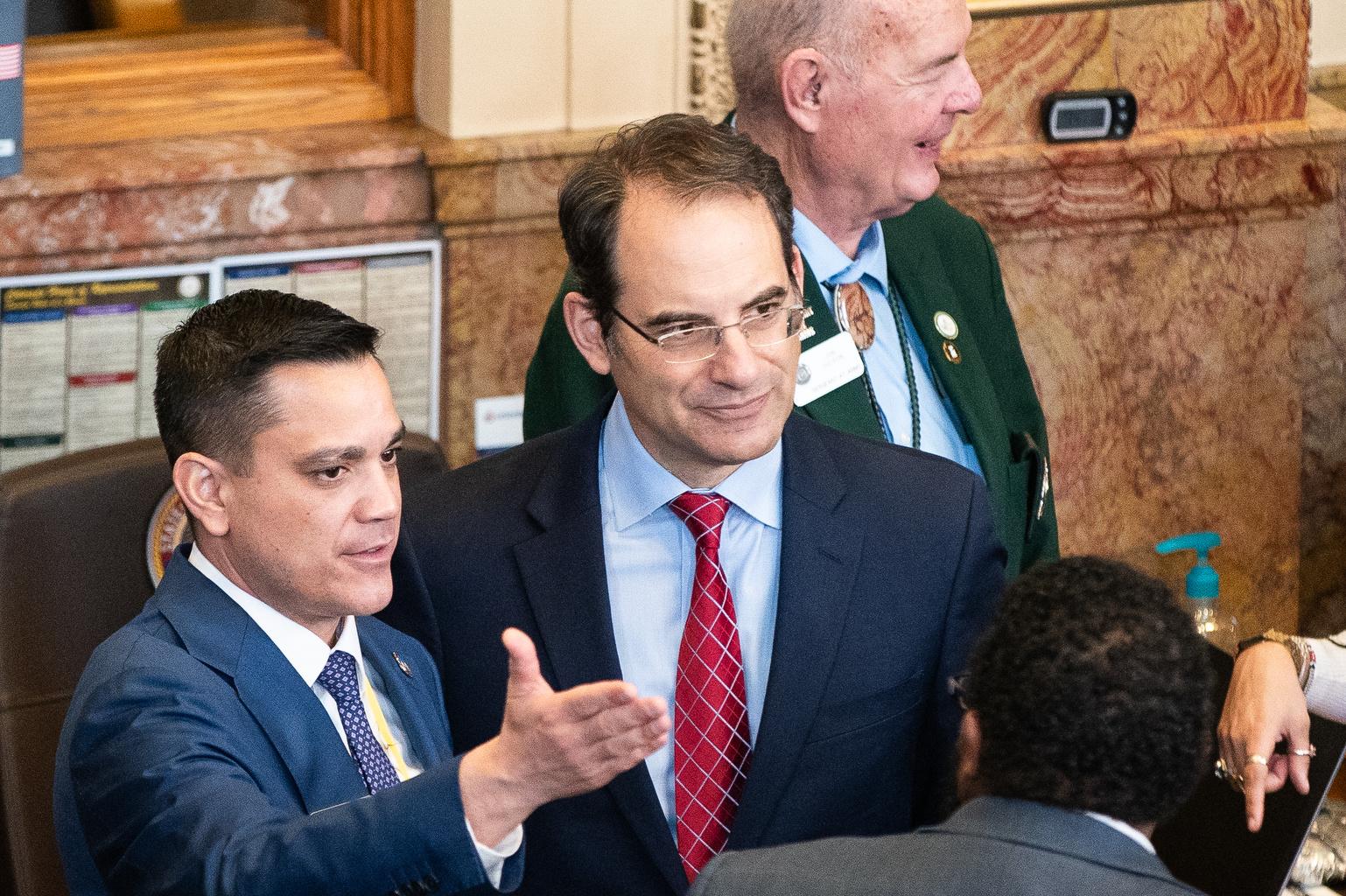
Before she enlisted about 20 years ago, Senior Master Sgt. -- and musician -- Claudia Weir says she hadn’t given much thought to the U.S. Air Force, which celebrates its 70th birthday this year.
Now the United States Air Force Academy Band, which calls Peterson Air Force Base near Colorado Springs home, is helping mark the milestone with a tour that features two new commissioned works. Weir and her band mates have traveled throughout Utah and Colorado with a final stop in Alamosa on Sunday.
Don’t let the “academy” part of the United States Air Force Academy Band throw you. These musicians are all full time, active-duty members of the service and their uniforms highlight that.
“We have the same training requirements, physical requirements that the rest of Air Force has,” Weir said. “We actually deploy as well. So we are active-duty Air Force."
Weir had a bachelor’s degree and was pursuing her master’s in clarinet performance at the University of Cincinnati’s College-Conservatory of Music when she heard about an audition for Air Force bands. She just wanted to play music, and she thought, well, why not check it out?
Airman 1st Class Michael Coletti says he also wanted to make a living as a musician, but the Air Force was not initially on his radar.
“One day I got a call from a friend, who said, ‘Hey. There’s an audition at the Air Force Academy and I think you should send in your materials,’” says Coletti, who'd been a freelance percussionist for several years. He took his friend’s advice.
“I probably had seven different streams of income and that can be fairly tedious over numerous years. And so eventually the opportunity to serve my country and to find stability was actually really a treat for me," he said.
New Commissioned Work
The band commissioned two new works to mark the 70-year Air Force milestone. One of those is “Rust Belt” by Orlando-based composer Christopher Marshall.

Capt. Shanti Simon is the band’s associate conductor and flight commander. She says “Rust Belt” has a “blue-collar” energy.
“Instead of playing... really light like you might play in a Mozart piece. We’re having [the band] play heavier to represent that machine like, cogging along feel,” says Simon. “You hear this in the way [Marshall] writes the rhythms -- there’s some very interesting interplay in between the trumpets and the steel drums and percussion is really important.”
For this tour, the band also premieres “First Light” by Montana composer David Maslanka. Simon says it’s a timely piece for the anniversary because it embodies the spirit and history of the Air Force in two parts.
One part is "very dark and uncomfortable and difficult emotionally to deal with,” Simon said. “Then the second part is light. It’s perseverance and it’s coming out of that darkness through the struggle. You can see the Air Force story in that struggle. And I think anyone personally can relate to that idea of going through a struggle and coming into the light.”
The band gives a fair amount of artistic freedom to composers when they commission them to create new work, Simon said. “We try not to limit too much what we ask of them because composers find inspiration almost on a daily basis and it can come from anywhere."

Some say military band music can help people understand the country’s history.
“It marks a moment in time and defines it in music," said Joe Tersero, the historian emeritus with the United States Air Force Band in Washington D.C. “If you listen to all these commissions throughout the years, it shows the progress.”
There were Air Force bands even before the service broke off from the Army. Inspired by European military bands, orders from the U.S. War Department established nearly 60 Armed Air Force bands in 1941. These bands toured the country, and some went overseas after the nation got involved in World War II. There were also radio broadcasts. And famous musicians like legendary bandleader Glenn Miller helped build up these bands.
Tersero said they played an important role in that war.
“If you take the original mission of the Air Force bands, it was to provide music to the soldiers, sailors, airmen and coasties,” said Tersero. “But it was also to keep the American public informed about what was going on.”
Today, military bands are also a part of the recruiting method for the armed forces. The Academy Band, which started out back in 1955, has since beefed up its touring and now makes use of outlets like social media, said Randy Doersch, the band’s superintendent of outreach. He's has been with the unit for decades, first as a musician and now as an administrator. He said there are less Air Force Academy musicians then there were in the 1950s.
“The military is just smaller too,” said Doersch. “It has to do with how priorities shift and also how budgets change.”
The band accounts for about 0.8 percent of the academy’s annual budget.

Weir, the Senior Master Sgt., says her 20 years with the Air Force and Air Force bands has deepened her love for her country.
“I think what keeps us in is the sense of patriotism and pride that we have wearing the uniform every day. And going around the whole country, the world really, playing for veterans,” said Weir.
Band members serve stateside and overseas, performing for deployed troops and at embassies. Capt. Shanti Simon was deployed for six months last year, stationed at Al Udeid Air Force Base in Qatar.
She was the officer-in-charge of the AFCENT Band, which is the Air Force’s Central Command Band, and oversaw two rock bands during her deployment. Simon said these bands help boost moral for U.S. troops.
“And through outreach, we build a positive image of the United States and the Air Force in local communities and schools,” said Simon.
Simon said there's also a bit of musical diplomacy.
“We like to see our mission as the other talon of the eagle on the great seal of the United States -- the one that clutches an olive branch rather than the arrows of war” said Simon. "In a sense that balances the might of a powerful Air Force with that diplomatic option of winning friends."
For now though, the musicians of the United States Air Force Academy Band are excited to tour the West and share this new music.
See the United States Air Force Academy Band
Here are the remaining dates:
Feb. 15: The Historic Avalon Theatre in Grand Junction at 7 p.m.
Feb. 16: Montrose Pavilion Conference Center in Montrose at 7 p.m.
Feb. 17: Montezuma-Cortez High School Auditorium in Cortez at 7 p.m.
Feb. 18: Bayfield Performing Arts Center in Bayfield, Colorado at 3 p.m.
Feb. 19: Richardson Hall at Adams State University in Alamosa at 3 p.m.









